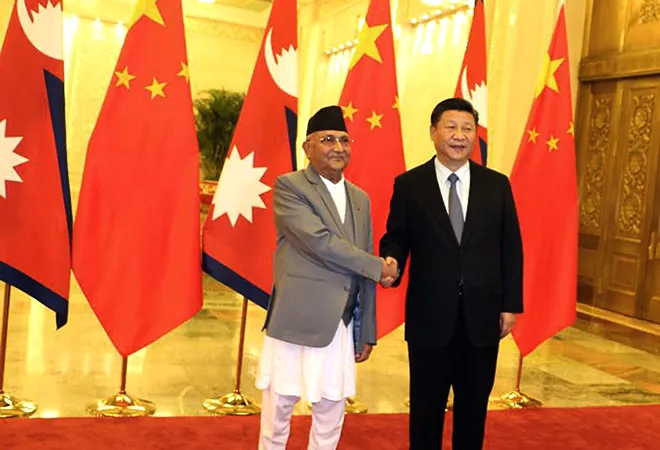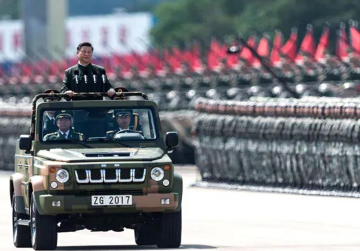 This is the 98th article in the series
This is the 98th article in the series The China Chronicles.
Read the articles here.
Amidst border tensions with India, Nepal ties with its northern neighbour China continues to flourish. Once considered a buffer state between India and China, Nepal under Prime Minister KP Sharma Oli has clearly shown an inclination to side with Beijing. Instigated by China, Nepal’s actions are provocative, which is not confined to just changes on a map. While introducing a new map is merely symbolic, Kathmandu has gone further with the
deployment of Nepalese Army on its border with India.
In another unprecedented development, Kathmandu also accepted China’s proposal to make
Mandarin mandatory in Nepal’s schools in an exchange for the payment of salaries to teachers. Furthermore, Nepal’s Communist Party scheduled a virtual meeting with the Communist Party of China (CPC) to discuss and share their experiences on running the party and the government. With Oli as the Prime Minister of Nepal, India is set to lose another neighbour to Chinese influence. India needs to come up with a more robust neighbourhood policy, or accept China as the new apex power in South Asia.
Rising Chinese sharp power in Nepal
Often dubbed as
‘China Threat 3.0’, the Chinese sharp power in Nepal comes with massive propaganda and national interests with implications for India’s influence in the region. Sharp power often incorporates tactics of pressure and coercion as a means to interfere, control and sway decisions of other countries. Thousands of youngsters in Nepal’s schools will soon be forced to learn Mandarin language as a part of their curriculum. This comes as a power move by the Communist Party of China, wherein making Mandarin mandatory was offered in exchange of salaries for their school teachers.
On the face of it, the new collaboration between the two countries will not only foster teaching Chinese language and culture, but it will also be utilized to promote China’s policies and interests in manoeuvring views of the people through a coalescence of literature, cultural affairs and exhibitions. These Confucius classrooms are controversial, largely due to their links to the Chinese government, and that these classrooms have been institutionalised to support Beijing’s political objectives. It is possible that such classrooms and understanding with the government of Nepal, Beijing will only manipulate and exploit Kathmandu against India.
While China’s cultural clout lingers behind India in the Hindu majority country, opportunities for Beijing to compensate for that imbalance emerged when Nepal’s Communist alliance, which often sides with China, won elections with an overwhelming majority. It was great news for China, given Nepal’s geostrategic position as a ‘buffer state’ between the two Asian giants.
Learning through shared experiences
More recently, Nepal’s Communist Alliance and Communist Party of China held a virtual meeting to share experiences on running the party and government. This is the
second time that a meeting of this kind is happening between the two countries. Though the political leaders from Nepal ascertained that the meeting was organised to learn from China’s ruling party, many believe that this shared political ideology will help introduce to Nepalese President Xi’s widely known doctrine ‘
Xi Jinping Thought’. These virtual meetings are a part of ‘training’ Nepal by Beijing to export its ideology, further its propaganda and helps flex its muscles across the region.
The summit entails that these ‘sharing of experiences’ are merely ‘virtual schools’ being run by CPC to expand its ideology beyond its own borders. Also, it’s essential to note the timing of such a meet. It comes a day after Nepal constitutionally adopts a controversial map, claiming Indian administered territories as its own. It also comes four days after the Galwan skirmish took place. Nepal risks burning bridges with India, which will only add to its problems at the cost itself of its identity, because Kathmandu continues to dance to the tunes of Beijing.
How India should counter balance emerging Nepal-China relationship in South Asia
As a vigorous effort to counter Chinese investments in Nepal, India increased Nepal’s share in its
financial aid from Rs. 375 crores in 2017-18 to Rs. 1,050 crores for the year 2019-20. Additionally, the Government of India has committed to fund
107.01 million Nepali Rupees for constructing three new school buildings in Darchula, Dhanusha, and Kapilvastu districts of Nepal. Such efforts are essential to counter balance rising Chinese influence in Nepal, but not enough after evaluating Beijing’s investments. India must expand and amplify additional such measures to advance its development partnership with Nepal to checkmate China.
Nepal has been a part of China’s Belt & Road Initiative (BRI) for the past six years. The BRI project, considered to be the centrepiece of Xi Jinping foreign policy has entrapped and pushed more than 10 countries in China’s debt- trap diplomacy. Pakistan, one of China’s closest allies, recently witnessed a
scam worth $630 million dollars from their apparent “all-weather friend”. With reports claiming that there is a lack of transparency in BRI projects at the global level, Nepal must be aware and learn from Pakistan’s lesson. Money trails leading from Pakistan all the way to China, Sri Lanka losing the
Hambantota port and Tajikistan signing over
1,000 sq km are just a few examples of costs a nation must bear while partnering with China. BRI is merely a move of China to grow its roots under its expansionist tactics across the world and India should help Nepal with its infrastructural needs to keep its Himalayan neighbour away from Beijing’s exploitative agenda.
Moreover, India needs to improve its communications and understanding with Nepal. India’s silence on issues have often been seen as the greatest cause of tensions and uncertainties between the two. Rather than objecting to the increased political hold of China, India must focus on advancing its relationship with Nepal. Reducing the expectations by desisting from labelling it a “special relationship”, India must work harder in building a pragmatic and realistic partnership with Nepal. This partnership must focus on common interests and mutual gains of the two in order to maintain a robust relationship.
As has often been suggested to India, to harness the strength of its relationship with Nepal through its centuries old cultural tie ups has backfired to a great extent. The BJP-led government which pledged to finance
Rs. 2.33 crores for a sanitation facility at the Pushapatinath Temple in Kathmandu did not receive the appreciation New Delhi expected. In 2018 as well, India aided Nepal in constructing a
400 bed Dharamshala in Kathmandu which cost Rs. 14 crores under its Nepal-Bharat Maitri Scheme. It is evident that India is not meeting the kind of investments China can offer to improve Nepal’s infrastructure needs. Moreover, while Hinduism is the largest religion in Nepal, it is no longer relevant to defining Nepalese domestic politics or its national interests. India, therefore, must re-calibrate its Nepal policy and stop treating itself as Nepal’s ‘elder brother.’
In February 2020, the
Nepal-China Transit protocol entered into force, ending Nepal’s reliance on India for international trade. This development is widely attributed to India’s imposition of an economic blockade in 2015, which increased Nepal’s economic problems significantly. In addition India’s interference with the promulgation of Nepal’s new constitution derailed Kathmandu to an extent that
PM KP Sharma Oli targeted India and blamed New Delhi for the spread of the Coronavirus in his country, calling it the “Indian Virus.” His remarks came a few days after he praised India for assisting Nepal in their fight against COVID-19. India’s cultural, political and economic influence over the past years have been highly counterproductive to its ties with Kathmandu. India needs to reset its relations with Nepal and re-invent its public diplomacy, rather than micromanaging Nepal, which has only undermined India-Nepal ties.
The views expressed above belong to the author(s). ORF research and analyses now available on Telegram! Click here to access our curated content — blogs, longforms and interviews.



 This is the 98th article in the series The China Chronicles.
Read the articles
This is the 98th article in the series The China Chronicles.
Read the articles  PREV
PREV

